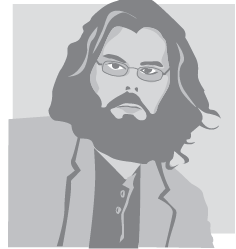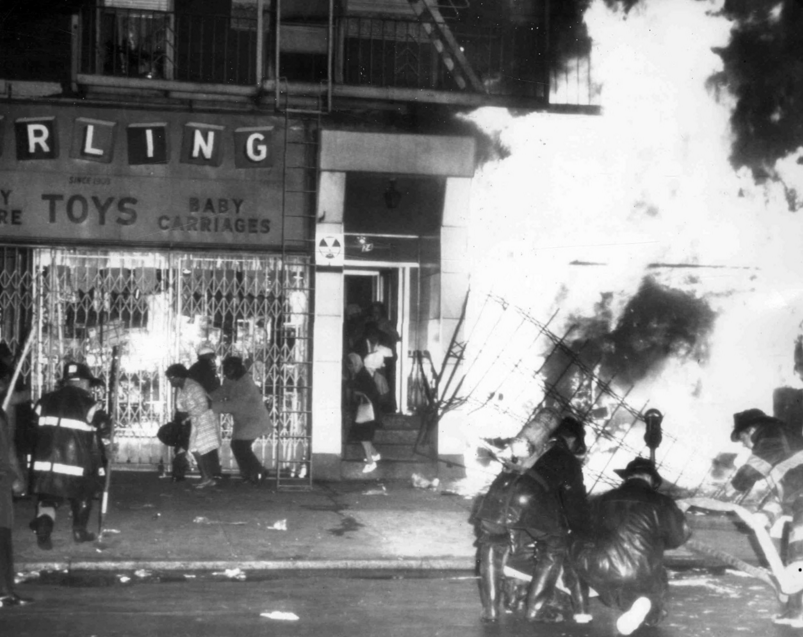 aNewDomain — Why do rioters sometimes burn down their own neighborhood?
aNewDomain — Why do rioters sometimes burn down their own neighborhood?
Whenever you try to talk about BlackLivesMatter, that question comes up – along with a weird host of side issues. Some others are: Are blacks killed more by police? (Proportionally, yes). Why do they resist arrest so much? (There isn’t evidence they do.) And is contempt of a cop an offense punishable by summary execution? (Well, just look at the news.)
I’d like to point out the tiniest flaw in the logic, an assumption inherent to all these questions and arguments.
The questions rely on the proposition that African Americans are different from other Americans.
It’s a stupid proposition.
You know, when famed football coach and inspirational leader Eddie Robinson was alive, he heard a thousand different compliments. His favorite, though, the one that meant something to him deep down, was when someone referred to him as a great American. Not as a black leader, not as the winningest coach in history, but as a great American outside of racial boundaries.
So let’s start there.
To the question of why rioting residents burn down their own neighborhood, I have another question for you. Ask yourself why would you do it? What would cause you to riot? What would cause you to form skirmish lines protecting protesters from police? What might lead you to climb a flagpole to take down the Confederate flag that has symbolized resistance against integration in your town for generations – all the while knowing you would serve jail time for doing so?
Why was Baltimore so violent, you wonder?
The real question is, why does any place descend into violence?
This same kind of reframing applies to other common questions, too. Like: What drives the ISIS fighters? Well, what would push you to become a contract killer for a Christian state?
The mistake we make all too often is that we forget that we’re all human. We’re all people.
To see yourself in the other is the first step to empathy. And you need empathy to solve any issue involving people, large or small.
You know, Irving Yalom writes beautifully about the process and theory of group psychotherapy. He notes that groups try very hard to help each other, beginning with giving advice. Do this, don’t do that, this worked for me.
Sure, it’s sincere. It may even be loving and genuine. But it’s ineffective. What happens is, people don’t take your advice. Or they have already tried everything you could think of already. Or they try your advice and fail the first time, and then they blame your bad advice for the whole thing.
Telling people what they should do and how they should feel never works.
Consider group therapy. When it’s effective it is because the people have stopped trying to solve one another’s problems and just started to listen to one another with an empathetic ear. The people in such a group get to the point where they all identify as one group, together, with some level of trust and intimacy. When you get to that point, hearing people’s problems, difficulties, struggles with this kind and loving ear seems to be all that is necessary for growth and change. It enables empowerment.
When it comes to embarking on the dream of equality, it is clearly not sufficient just to listen lovingly, to get past advice-giving.
But it is vitally necessary.
You can’t hear the problems so long as you are talking.
Look, in Baltimore, they tried everything already. There is nothing you could suggest that would work. They tried the democratic process, tried getting jobs, tried going to the media, tried sitting still and saying “Yes, sir” when the police came around. These people are us, and it is the failure of our behavior to meet their needs that is the problem.
We can no longer solve our problems apart, alone, disintegrated.
And it’ll never work.
Accurate empathy and positive regard are missing from this relationship and that’s a problem, but one we can choose to fix from our side the way Martin Luther King, Jr. tried to fix it from his.
When we listen, we might find out the answer to the last and most important question for people of good conscience, the question that vexes us the most, makes us feel hopeless and helpless as allies: What can I do?
If you can listen, you might find out that you did enough. You did everything that was necessary.
And it worked.
For aNewDomain, I’m Jason Dias.
Cover image: Chicago riots following the assassination of MArtin Luther King Jr. in 1968, The Atlantic, All Rights Reserved













